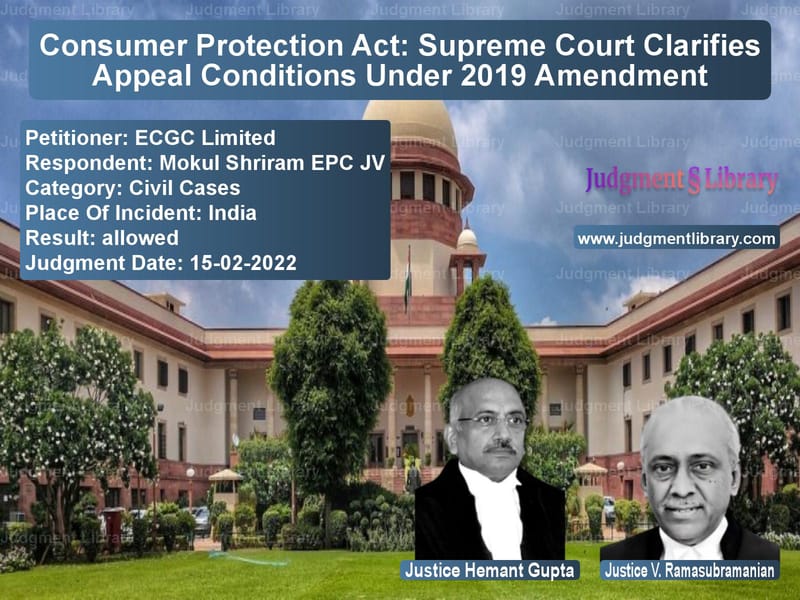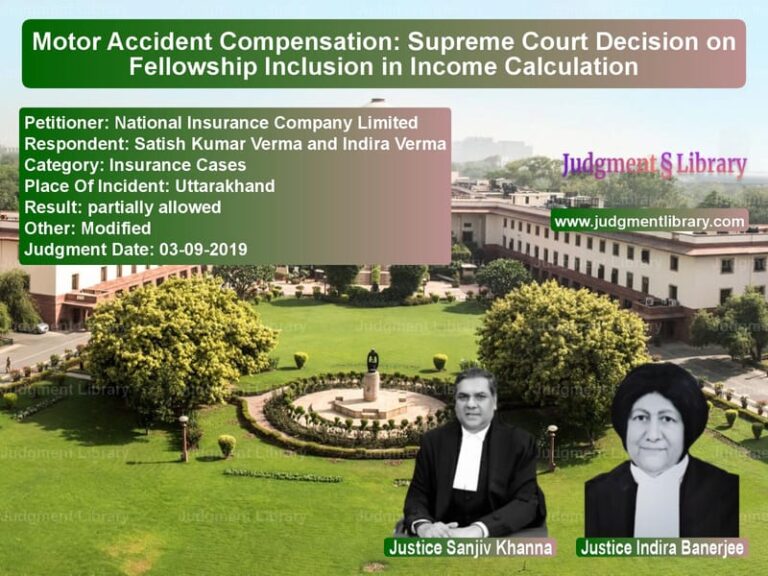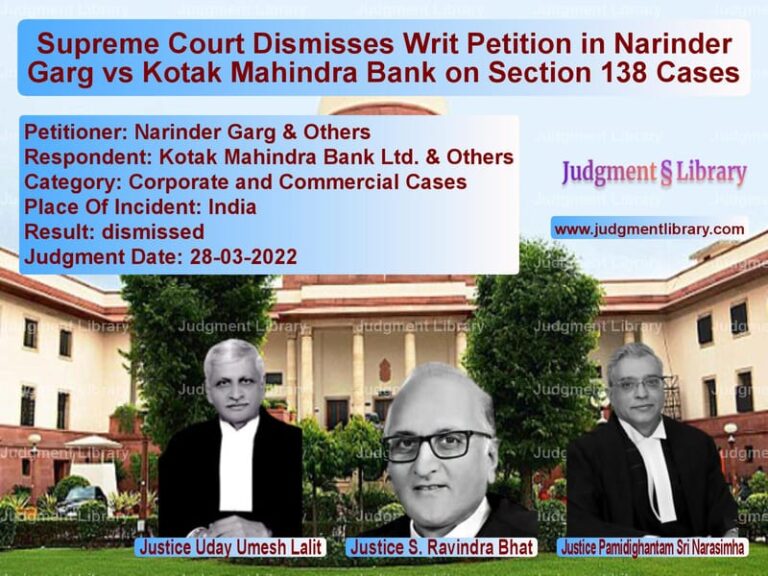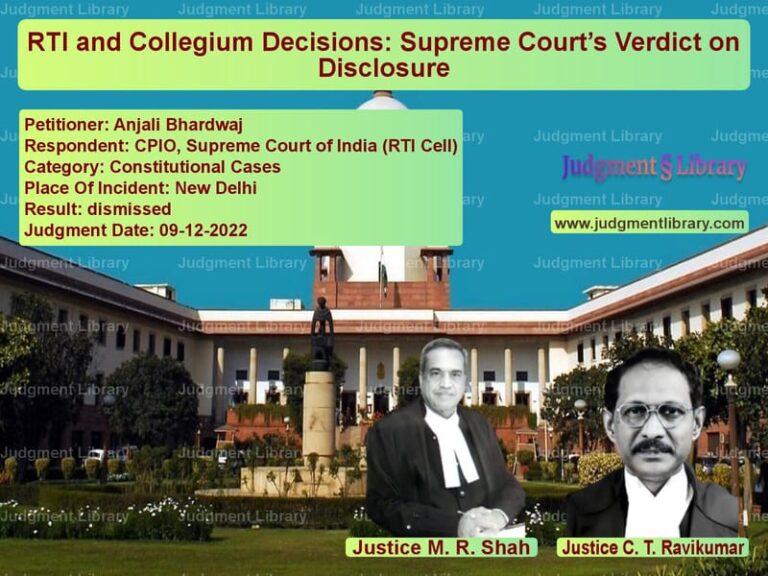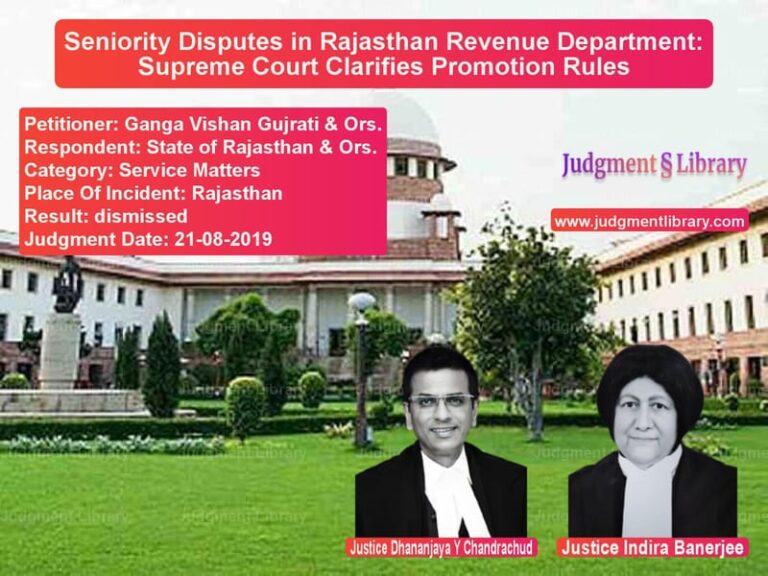Consumer Protection Act: Supreme Court Clarifies Appeal Conditions Under 2019 Amendment
The Supreme Court, in ECGC Limited vs. Mokul Shriram EPC JV, addressed a critical issue regarding the applicability of the 2019 amendment to the Consumer Protection Act on appeals arising from cases filed under the previous 1986 Act. The case revolved around whether the stringent pre-deposit condition of 50% of the awarded amount for filing an appeal applied retrospectively to cases initiated before the new law came into force.
Background of the Case
The dispute arose when the National Consumer Disputes Redressal Commission (NCDRC) directed ECGC Limited to pay Rs. 265.01 crores, along with 10% interest per annum, to the complainant, Mokul Shriram EPC JV. The order stated that failure to comply would lead to an enhanced interest rate of 12% per annum. ECGC filed an appeal before the Supreme Court, arguing that it should be governed by the 1986 Act, which required a lower pre-deposit amount.
Arguments by the Parties
Petitioner’s Arguments (ECGC Limited)
- The appeal was filed under Section 23 of the Consumer Protection Act, 1986, which allowed a pre-deposit of Rs. 50,000, rather than the stringent 50% deposit required under the 2019 Act.
- The law applicable at the time of initiation of a legal proceeding should govern the appeal, not subsequent amendments.
- Section 6 of the General Clauses Act protects accrued rights under a repealed law unless explicitly overridden by the new law.
- The 2019 Act was more burdensome and could not be applied retrospectively to cases that commenced under the 1986 Act.
Respondent’s Arguments (Mokul Shriram EPC JV)
- The procedural change in the pre-deposit requirement should apply retrospectively, as the right of appeal is a statutory privilege, not an inherent right.
- The Consumer Protection Act, 2019, replaced the 1986 Act, and all pending appeals should be governed by the new provisions.
- Consumer protection laws are remedial and beneficial, and any interpretation should favor consumers.
Supreme Court’s Key Observations
1. Appeal Rights Are Substantive, Not Mere Procedure
The Supreme Court reaffirmed that the right to appeal is a substantive right that accrues at the initiation of a legal proceeding:
“A right of appeal is not merely a matter of procedure. It is a substantive right. This right becomes vested in a party when proceedings are first initiated in, and before a decision is given by, the inferior court.”
2. General Clauses Act Preserves Rights Under Repealed Laws
The Court referred to Section 6 of the General Clauses Act, which ensures that repealed laws do not extinguish rights, privileges, obligations, or liabilities unless explicitly stated. The judgment noted:
“The repeal shall not affect any right, privilege, obligation, or liability acquired, accrued, or incurred under any enactment so repealed.”
3. Stringent Pre-Deposit Not Retrospective
The Court ruled that the condition to deposit 50% of the awarded amount was an onerous new requirement and could not apply to cases filed before the 2019 Act came into force:
“Imposing a stringent pre-deposit condition on appeals arising from cases initiated under the 1986 Act would be an unreasonable restriction and cannot be applied retrospectively.”
4. Consumer Protection Act, 2019, Does Not Expressly Override the 1986 Act for Pending Cases
The Court noted that while the new law governs future cases, it does not explicitly state that pending cases would be subject to the new appeal conditions. The Court cited:
“The law that was applicable at the time of initiation of a lis would continue to apply unless there is a clear legislative intent to the contrary.”
5. Legislative Intent and Precedents
The Court cited various precedents, including Hoosein Kasam Dada (India) Ltd. vs. State of Madhya Pradesh, where it was ruled that amendments imposing additional burdens on appeal must be explicitly retrospective:
“A substantive right of appeal cannot be taken away except by express enactment or necessary intendment.”
Final Judgment
Based on these findings, the Supreme Court ruled:
- The pre-deposit requirement of 50% under the 2019 Act does not apply to appeals arising from cases initiated under the 1986 Act.
- ECGC Limited’s appeal should be governed by the 1986 Act, requiring only a Rs. 50,000 pre-deposit.
- The appeal was allowed to proceed without the additional burden imposed by the 2019 Act.
Impact of the Judgment
This ruling has far-reaching implications for consumer litigation:
- Prevents unfair retrospective application: Ensures that stricter legal provisions do not unfairly burden litigants who initiated proceedings under earlier laws.
- Clarifies the transition between repealed and new laws: Establishes that substantive rights accrued under previous laws are protected.
- Limits state-imposed financial burdens on appellants: Ensures fair access to appellate remedies without imposing unreasonable financial conditions.
The Supreme Court’s decision reinforces the fundamental legal principle that amendments imposing additional burdens do not apply retrospectively unless expressly stated, thereby safeguarding the rights of litigants under the older legal framework.
Petitioner Name: ECGC Limited.Respondent Name: Mokul Shriram EPC JV.Judgment By: Justice Hemant Gupta, Justice V. Ramasubramanian.Place Of Incident: India.Judgment Date: 15-02-2022.
Don’t miss out on the full details! Download the complete judgment in PDF format below and gain valuable insights instantly!
Download Judgment: ecgc-limited-vs-mokul-shriram-epc-jv-supreme-court-of-india-judgment-dated-15-02-2022.pdf
Directly Download Judgment: Directly download this Judgment
See all petitions in Consumer Rights
See all petitions in Judgment by Hemant Gupta
See all petitions in Judgment by V. Ramasubramanian
See all petitions in allowed
See all petitions in supreme court of India judgments February 2022
See all petitions in 2022 judgments
See all posts in Civil Cases Category
See all allowed petitions in Civil Cases Category
See all Dismissed petitions in Civil Cases Category
See all partially allowed petitions in Civil Cases Category

